Farquhar McGillivray Knowles
Farquhar McGillivray Knowles (May 22, 1859 – April 9, 1932) was a Canadian painter who spent much of his life in Canada. He was best known for his seascapes.
Farquhar McGillivray Strachan Stewart Knowles | |
|---|---|
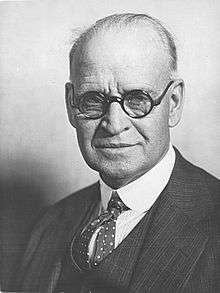 Farquhar McGillivray Knowles in 1930 | |
| Born | May 22, 1859 Elora,Ontario, Canada |
| Died | April 9, 1932 (aged 72) Toronto, Ontario, Canada |
| Nationality | Canadian |
| Occupation | Painter |
| Known for | Seascapes |
Early years
Farquhar McGillivray Knowles was born in Elora Village, Nichols Twp., Wellington Co., Ontario, Canada on May 22, 1859.[1] His parents were Scottish in origin. In 1863 Knowles was educated in Guelph, Ontario. Due to the influence of his grandfather Thomas Knowles (Royal Hibernian Marine) Farquhar enrolled in the artillery at the military academy in West Point around 1877. He suffered a serious accident in his fourth year which ruled out a military career.[2]
Knowles found work in New York City retouching photographs, and took some art courses there.[2] He returned to Canada where he found employment with the William Notman and John Fraser photographic studios in Toronto. He added color to their portrait photographs of wealthy customers.[3] The studio's co-owner was John A. Fraser, R.C.A., an accomplished watercolor artist, who instructed him in painting miniatures and watercolors.[2] In 1885 McGillivray Knowles went to Europe, where he studied painting in England and France.[3] Knowles married Ada Cullen, who died in 1887.[2]
Career
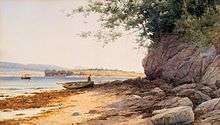
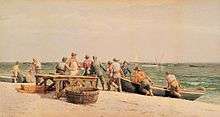
Knowles was elected an Associate of the Royal Canadian Academy of Arts in 1889 based on his reputation as a watercolor artist. He married his former student Elizabeth Annie Beach (1866–1928) in 1890.[2] She was a niece of the well-known Canadian painter Frederic Marlett Bell-Smith.[3] They went to Europe in 1891. Knowles studied in England for two years under Sir Hubert von Herkomer, R.A., and then in Paris for four years under Benjamin Constant, Jean-Paul Laurens, Henri Gervais and Veir Schmidt.[2]
The couple returned to Canada and opened a school of painting, design, ceramics and life classes. A biographer wrote of Knowles at this time, "He was also keenly interested in literature, music, and in his moments of leisure indulged in a passion for carpentry, yachting, motoring, shooting and travel. Some years ago his beautiful studio in Toronto was filled with pictures, rugs, and quaint curios picked up in many parts of the world, and there he and his accomplished wife, herself also a musician and artist . . . kept open house, for they had a wide circle of friends and occupied a prominent place in the social life of the city".[2]
Their studio in Toronto became a meeting place for artists.[4] Knowles became renowned for his harbor scenes and seascapes, and also painted decorative murals in the houses of wealthy patrons.[3] In 1911 Knowles installed eleven mural panels in the music room of the wealthy Eaton family of Toronto. They depicted historical musical scenes and included one of Arcadia with Pan playing his pipes, and his goats.[5]
The couple spent 1916 living on their yacht in New York Harbor, where Knowles painted the harbor. At this time he was aged fifty-seven. They returned to Toronto, but in 1920 moved to New York.[2] They took an apartment in Washington Heights, Manhattan.[6] They often returned to Canada and participated in the main exhibitions, including the annual exhibitions of the Royal Canadian Academy.[2]
Farquhar and Elizabeth Knowles had a studio at their summer residence in Riverton, New Hampshire. Elizabeth McGillivray Knowles died on October 4, 1928 in Lancaster, New Hampshire.[4] In 1931 Farquhar Knowles married Lila Taylor, an artist and former student.[2] Farquhar McGillivray Knowles died in Toronto on April 9, 1932.[1]
Work
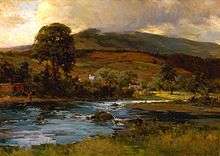
Knowles was best known for his marine studies. A reviewer in the Ottawa Citizen describing an exhibition in Ottawa wrote, "In the United States he has a strong following of those who admire his pictures of the sea. There are a number of these on view at the present exhibition and a few of them represent his highest achievement in this direction. They are all notable for their freedom of movement and authentic atmosphere. One of these is 'Windswept,' a very successful rendering of air, sky and water as the tide begins to ebb on a bright boisterous day. Another is 'Shades of Evening,' which depicts a seaway set against a range of steep and sombre hills. The whitecaps dance and the wind carries the waves before it. It is close of day, and the last rays of the sun strike the summit of the hills in the background while a ghostly schooner runs for home in the shaded lee of the cliffs."
The Mail & Empire said, "His 'Titan Bathers' was for many years one of the most notable pictures in the Chicago Art Institute. Land and sea pictures from his brush are to be found in nearly all Toronto's seats of higher education and of his best known portraits might be mentioned those of Sir Robert Falconer, Hon. Chester Massey, Mrs. Timothy Eaton and Miss Addison. His series 'The History of Music' is in the deaconess home in this city, and the 'Finding of Leander by Hero' has been for years in the Ontario Art Museum."[2]
The photographer Margaret Watkins visited Annie and Farquhar McGillivray Knowles in New York in 1923. She wrote they, "are both awfully orthodox in their work and made a great to-do about the modern movement in art ... My prints are a darned sight more up and coming than his silly little paintings of boats and pink apple trees. They are beginning to realize that their attitude is a bit behind the times and instead of catching up with the procession they wax sarcastic and grouch on the side."[7]
Gallery
 Getting Up Steam, c 1891
Getting Up Steam, c 1891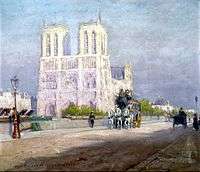 Notre Dame, Paris, 1895
Notre Dame, Paris, 1895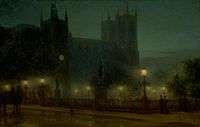 Westminster, 1895
Westminster, 1895- Farmyard, 1902
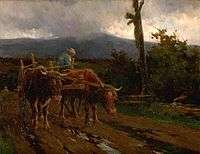 The Wayside Cross, 1905
The Wayside Cross, 1905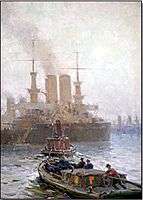 In Time of Peace, 1907
In Time of Peace, 1907 Beaupré, 1909
Beaupré, 1909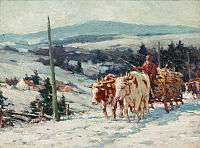 The Hay Cart, before 1933
The Hay Cart, before 1933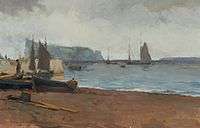 Percé, Quebec, undated
Percé, Quebec, undated
Exhibitions and collections
A Memorial Exhibition of paintings, prints, drawings and lithographs of F. McGillivray Knowles was held at The Art Gallery of Toronto in October 1932. The paintings were assembled from a large number of private collections in Ontario. Other exhibitions of his work included:
- 1941: Mellors Galleries, Toronto
- 1944: Robert Simpson Co. Canadian House of Art, Toronto. The exhibition also included paintings by Elizabeth Knowles and Lila C. Knowles
- 1966: Jerrold Morris International Gallery, Toronto
At least three of his paintings are held by the National Gallery of Canada, and four are held by the Agnes Etherington Art Centre at Queen's University in Kingston, Ontario.[2]
Sources
- "Canadian Artist Called by Death". The Montreal Gazette. October 5, 1928. Retrieved July 7, 2014.
- "Farquhar McGillivray Knowles". National Gallery of Canada. Retrieved August 2, 2014.
- "Farquhar McGillivray Knowles (1859-1932)". The Canada Site. Retrieved August 2, 2014.
- "Farquhar McGillivray Knowles and Elizabeth Annie (Beach) McGillivray Knowles". The Grinnell at 100. Retrieved July 7, 2014.
- Huneault, Kristina; Anderson, Janice (April 11, 2012). Rethinking Professionalism: Women and Art in Canada, 1850-1970. McGill-Queen's Press - MQUP. ISBN 978-0-7735-3966-2. Retrieved August 2, 2014.CS1 maint: ref=harv (link)
- MacDonald, Colin S. (2006). "KNOWLES, Farquhar McGillivray Strachan Stewart". A Dictionary of Canadian Artists. National Gallery of Canada / Musée des beaux-arts du Canada. Archived from the original on August 8, 2014. Retrieved August 2, 2014.CS1 maint: ref=harv (link)
- McKay, Marylin J. (April 12, 2011). Picturing the Land: Narrating Territories in Canadian Landscape Art, 1500-1950. MQUP. ISBN 978-0-7735-9096-0. Retrieved August 2, 2014.CS1 maint: ref=harv (link)
- Prakash, A.K. (2015). Impressionism in Canada: A Journey of Rediscovery. Stuttgart: Arnoldsche Art Publishers. pp. 266–295. ISBN 978-3-89790-427-9.